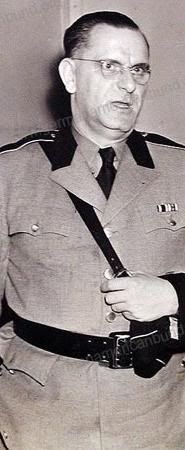Fritz Kuhn
From Kaiserreich
MaskedPickle (Talk | contribs) |
|||
| Line 1: | Line 1: | ||
{{image|http://i231.photobucket.com/albums/ee48/Cornichouille/Kaiserpedia/Kuhn.jpg|right|AH|Fritz Kuhn}} | {{image|http://i231.photobucket.com/albums/ee48/Cornichouille/Kaiserpedia/Kuhn.jpg|right|AH|Fritz Kuhn}} | ||
| - | '''Fritz Julius Kuhn''' (born on May, 15 1896 in Munich, [[Germany]]) is a German-born [[ | + | '''Fritz Julius Kuhn''' (born on May, 15 1896 in Munich, [[Germany]]) is a German-born [[Freistaat Mittelafrika|Mittelafrikan]] politician. He is one of the leaders of the hardline within the German settler community. |
==Biography== | ==Biography== | ||
| - | Kuhn was born in Munich to Georg Kuhn and Julia Justyna Beuth in Germany. During the [[Weltkrieg]], Kuhn earned an Iron Cross as an infantry lieutenant. After the war, he graduated from the University of Munich with a master's degree in chemical engineering. Having joined various Pan-Germanist movements in Germany, he rallied to the Grossdeutsche Volkspartei when it was created by [[Ernst Röhm]]. Candidate to German settlement in the [[United Baltic Duchy]] in 1924, he was however expelled two years later after having being convinced of violence against the Native populations. In 1928, he moved to | + | Kuhn was born in Munich to Georg Kuhn and Julia Justyna Beuth in Germany. During the [[Weltkrieg]], Kuhn earned an Iron Cross as an infantry lieutenant. After the war, he graduated from the University of Munich with a master's degree in chemical engineering. Having joined various Pan-Germanist movements in Germany, he rallied to the Grossdeutsche Volkspartei when it was created by [[Ernst Röhm]]. Candidate to German settlement in the [[United Baltic Duchy]] in 1924, he was however expelled two years later after having being convinced of violence against the Native populations. In 1928, he moved to Mittelafrika. |
===Entry in politics=== | ===Entry in politics=== | ||
| - | Quickly rising in the German- | + | Quickly rising in the German-settler community, Kuhn has come to the attention of [[Hermann Goering]] who had also been expelled from the United Baltic Duchy for crimes against the natives. Kuhn seems to be a rising political force in the Statthalter's 'court.' |
| - | |||
| - | |||
| - | [[Category:People]] [[Category:German-related topics]] [[Category: | + | [[Category:People]] [[Category:German-related topics]] [[Category:African-related topics]] [[Category:National-Populism]] |
Current revision as of 16:09, 11 November 2013
|
Fritz Julius Kuhn (born on May, 15 1896 in Munich, Germany) is a German-born Mittelafrikan politician. He is one of the leaders of the hardline within the German settler community.
Biography
Kuhn was born in Munich to Georg Kuhn and Julia Justyna Beuth in Germany. During the Weltkrieg, Kuhn earned an Iron Cross as an infantry lieutenant. After the war, he graduated from the University of Munich with a master's degree in chemical engineering. Having joined various Pan-Germanist movements in Germany, he rallied to the Grossdeutsche Volkspartei when it was created by Ernst Röhm. Candidate to German settlement in the United Baltic Duchy in 1924, he was however expelled two years later after having being convinced of violence against the Native populations. In 1928, he moved to Mittelafrika.
Entry in politics
Quickly rising in the German-settler community, Kuhn has come to the attention of Hermann Goering who had also been expelled from the United Baltic Duchy for crimes against the natives. Kuhn seems to be a rising political force in the Statthalter's 'court.'

